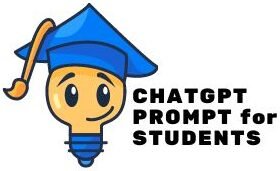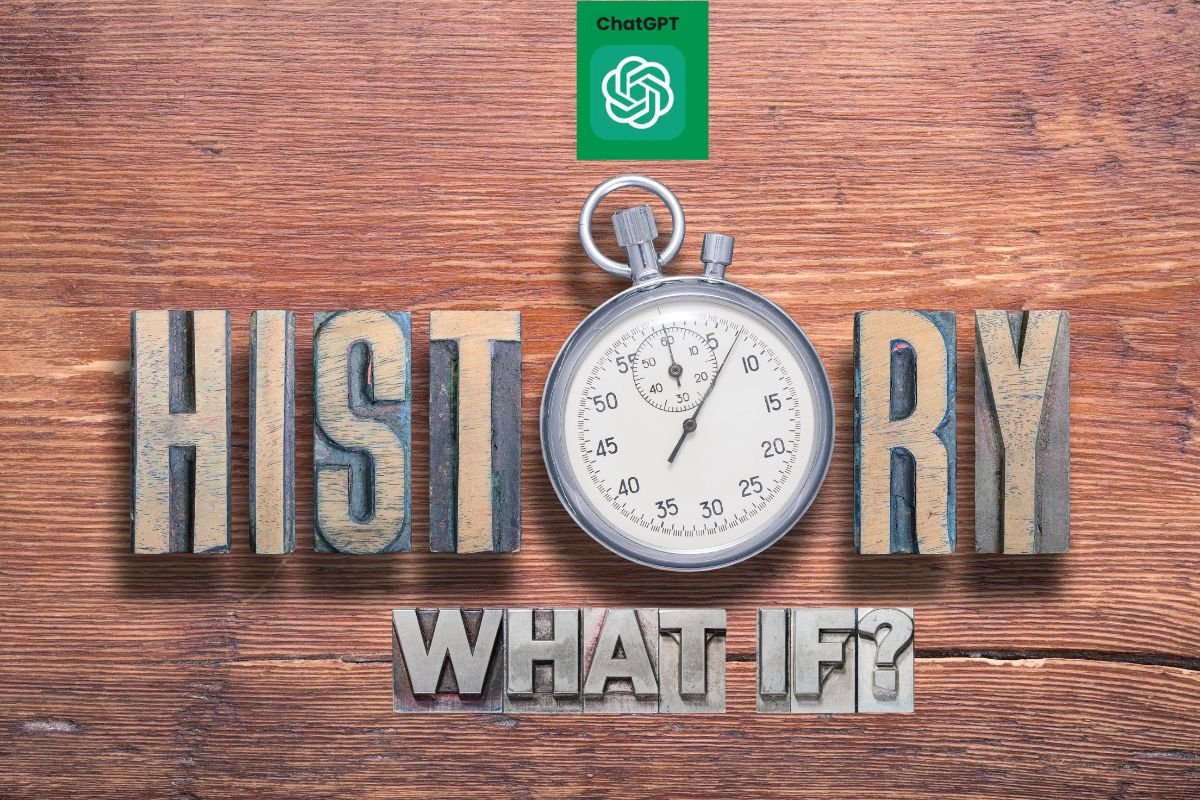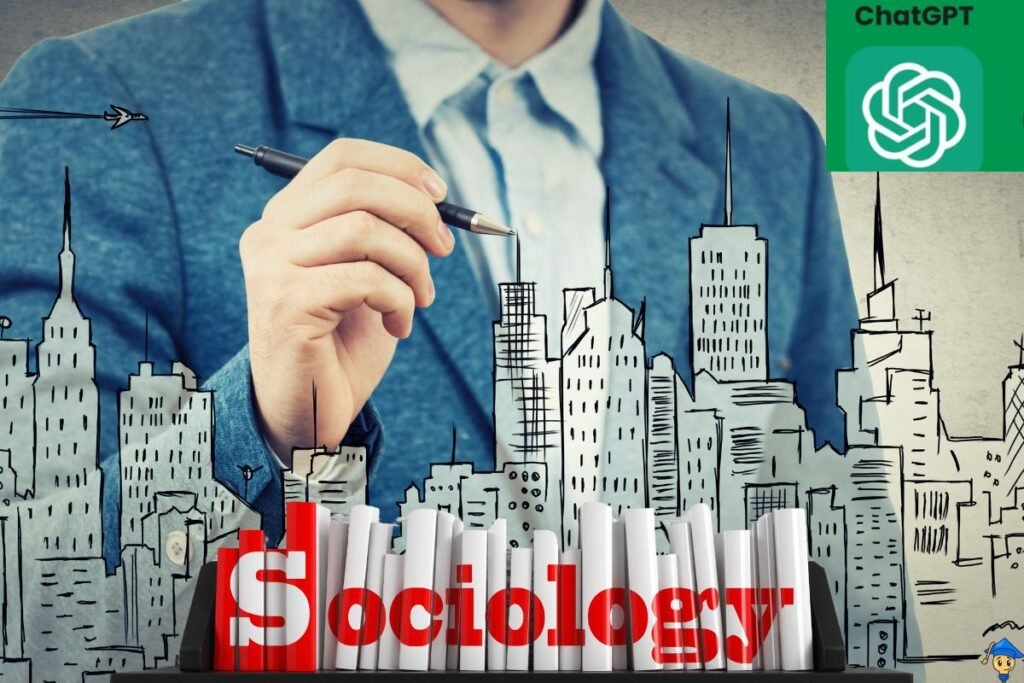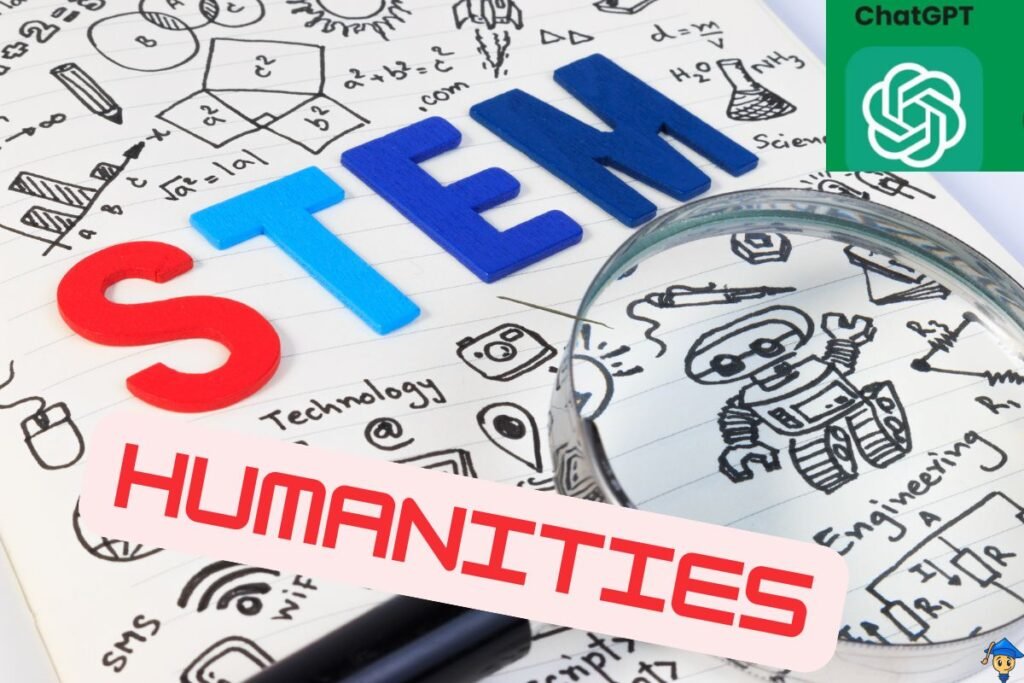History is full of pivotal moments that shaped the world we live in today. But what if things had turned out differently? What if key decisions had gone the other way, or if influential figures had chosen alternate paths? However, these intriguing “what if” scenarios have long been the playground of historians and writers alike.
Nowadays, with the help of ChatGPT, we can dive even deeper into these alternate histories, exploring the endless possibilities through creative essay prompts.
In this article, I’ll show you how to use ChatGPT to unlock history’s biggest “what ifs,” sparking your imagination and giving you a fresh perspective on the past.
Let’s dive in!
Understand Historical ‘What If’ Scenarios
So, understanding these alternate histories is crucial for several reasons. First and foremost, they can illuminate the significance of pivotal moments and leadership decisions, helping us fathom the delicate balance that shapes our world. Furthermore, engaging with these scenarios nurtures critical thinking and creativity, especially among students. Therefore, exploring historical ‘what ifs’ encourages learners to question causes and effects. Obviously, they develop a nuanced perspective of history and appreciate the consequences of human actions.
Certainly, for educators, introducing historical ‘what if’ scenarios can be an innovative approach to teaching history. By presenting events with multiple potential outcomes, students can engage in lively discussions and debates, fostering a more dynamic and interactive learning environment. This method helps students connect with history on a personal level, seeing it not as a series of fixed events but as a tapestry of possibilities and choices.
Additionally, this exploration can enhance one’s analytical skills. It compels individuals to research and evaluate different historical contexts critically and assess the plausibility of various outcomes. Articles such as “The Importance of Studying History” and resources from Edutopia highlight how these scenarios can transform history education, making it more engaging and thought-provoking.
In summary, historical ‘what if’ scenarios are more than speculative exercises; they are vital tools for enriching our understanding of history. They provide a unique lens to view the past and encourage a level of analysis and creativity that can profoundly impact how we perceive historical events.
Using ChatGPT for Generating ‘What If’ Prompts
ChatGPT has emerged as a transformative tool for enhancing the creation of ‘what if’ scenarios in history essays, offering an innovative approach compared to traditional methods. Typically, generating these hypothetical questions necessitates hours of research and creative thinking. However, ChatGPT simplifies this process through its advanced language model, which is expertly trained on a vast corpus of historical data and creative thinking frameworks. This integration allows for the swift generation of engaging and thought-provoking scenarios.
‘What if’ Prompts
To begin using ChatGPT for this purpose, users can input specific historical events or general periods into the system, along with a query that indicates their desire for ‘what if’ prompts. For instance, a user might input “What if scenarios for World War II” or “Hypothetical events during the Renaissance.” ChatGPT then processes this request to offer unique and diversified prompts that can challenge conventional narratives and stimulate critical analysis. This AI-driven method stands in stark contrast to more manual, resource-intensive approaches historically employed by researchers and educators.
Ease of Use and Super Fast Response
The ease of use and rapid response time are among the biggest advantages of using ChatGPT. For example, within seconds, ChatGPT might generate scenarios such as, “What if Winston Churchill had not been Prime Minister during WWII?” or “What if the Black Plague had not decimated Europe?” or ” What if Mahatma Gandhi had not called off Quit India Movement?” These prompts can inspire deep exploration and nuanced understanding among students and enthusiasts alike.
‘What if’ Prompt Examples
Following are the examples of “What Ifs” ChatGPT prompts focusing on Indian history:
Prompt 1: “What if the British East India Company never established control over India? Provide a brief alternative history scenario for the Indian subcontinent from the 18th century onwards.”
Let’s see, for example, the following screenshot of the output:
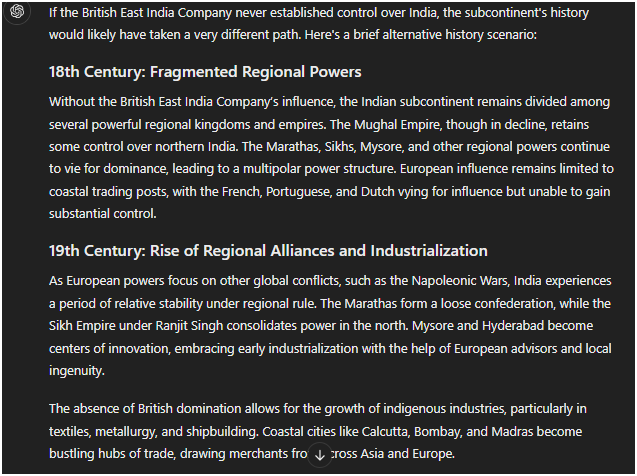
If you are a Bengali medium student, write this follow-up instruction at the chatbar “Translate it into Bengali”. The following is the screenshot of a glimpse of the output:
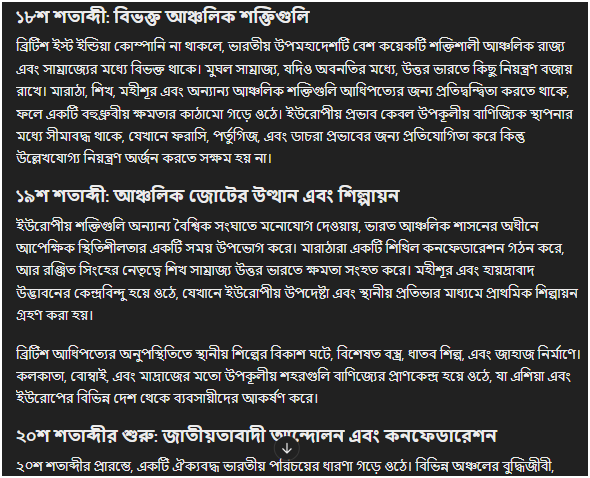
Prompt 2: “What if Emperor Ashoka had not converted to Buddhism after the Kalinga War? Describe how this might have affected the spread of Buddhism in ancient India and neighboring regions.”
Prompt 3: “What if the Mughal Empire had successfully resisted European colonization attempts? Outline potential political and cultural developments in India from the 18th to 20th centuries.”
Prompt 4: “What if India and Pakistan had remained a single country after independence in 1947? Discuss the possible social, economic, and geopolitical implications for the region.”
Prompt 5: “What if Mahatma Gandhi’s non-violent resistance movement had failed? Suggest an alternative path to Indian independence and its potential consequences.”
Prompt 6: “What if Dr. B.R. Ambedkar’s proposal for separate electorates for Dalits had been accepted instead of the Poona Pact in 1932? Discuss how this might have affected caste relations and political representation in modern India.”
Availability of Plenty of Guidance
For those unfamiliar with using ChatGPT, there are numerous tutorials and guides available that detail how to effectively employ this tool for generating customized historical inquiries. So, platforms like OpenAI’s official documentation provide insights into fine-tuning prompts and maximizing the utility of ChatGPT’s capabilities. Additionally, educational websites and video guides offer step-by-step instructions catering to various user proficiency levels.
In a significant shift from traditional methods, ChatGPT democratizes the process of engaging with history’s ‘what ifs,’ making it accessible and efficient for anyone with an interest in diving deeper into alternative historical narratives.
Benefits of ‘What If’ Scenarios in History Assignments
Incorporating ‘what if’ scenarios into history assignments, of course, offers numerous educational benefits. These scenarios compel students to engage actively with historical material, stimulating their imagination and curiosity.
Develop a Deeper Knowledge
By considering alternative historical outcomes, students develop a deeper understanding of cause-and-effect relationships and the complexity of historical events. For example, contemplating what might have happened if the Allies had lost World War II encourages students to analyze strategic decisions, geopolitical dynamics, and the consequences of different historical paths.
Foster your Love for History
Enhanced engagement is one of the key advantages of using ‘what if’ scenarios. When students are tasked with imagining alternative outcomes to historical events, they are more likely to feel invested in their assignments. This method transforms passive learning into an active, inquiry-based experience, fostering a love for history. Real-life classroom examples, such as role-playing debates on hypothetical scenarios, further demonstrate how these exercises lead to heightened student interaction and enthusiasm.
Become a Critique
Critical thinking is another significant benefit. ‘What if’ scenarios require students to evaluate the likelihood of different outcomes and the factors that influence these possibilities. This kind of analysis demands robust critical thinking skills, as students must critique sources, weigh evidence, and construct logical arguments. In doing so, they also enhance their problem-solving abilities, making them better equipped to tackle complex issues both within and outside the classroom.
Interconnect Past and Present
Moreover, these scenarios can help students connect historical knowledge to broader educational goals, such as understanding the significance of historical events and their impact on contemporary society. Exploring alternative histories can reveal the fragility and contingency of our current world, prompting students to appreciate the interconnectedness of past and present.
To further explore how ‘what if’ scenarios can enhance classroom engagement and learning outcomes, you can ask your educators for additional resources.
Writing a ‘What If’ history essay can be a fascinating exercise in historical analysis and creative thinking. Such essays require a delicate balance between factual accuracy and imaginative speculation.
Here are some practical tips to help students craft a compelling ‘What If’ history essay:
Choose a Thought-Provoking Prompt
Begin by selecting a prompt that intrigues you and offers ample scope for exploration. The prompt should ideally address a pivotal moment in history where the outcome could have been different under alternative circumstances. Ensure that the scenario you are considering is significant enough to explore the broader implications of the ‘what if’ question.
Conduct Thorough Research
A well-crafted ‘What If’ history essay necessitates thorough research of the actual historical events. Delve into primary sources such as historical documents, letters, and eyewitness accounts, along with secondary sources like scholarly articles and historical analyses. Understanding the factual backdrop of the scenario will enable you to make informed speculations.
Structure Your Essay Effectively
Organize your essay with a clear structure: an introduction, body paragraphs, and a conclusion. The introduction should present the historical event and your ‘what if’ question. Each body paragraph can explore different aspects of the alternate scenario – perhaps its political, economic, and social implications. Maintain a logical flow and ensure each paragraph contributes to your overarching argument.
Balance Imagination with Historical Accuracy
While it’s crucial to be imaginative, your speculations should remain grounded in historical context. Consider how realistic your alternate scenario is, given the historical facts and figures you have researched. Ask yourself whether the changes you are proposing could realistically have happened considering the historical conditions of the time.
Utilize Useful Resources and Tools
Additionally, leverage various resources to aid your writing process. Online databases and libraries can provide access to primary and secondary sources. Websites like Purdue OWL offer excellent guidance on essay writing, including tips on crafting arguments and citations. Historical association sites and academic journals can also provide valuable insights and information.
By following these steps, students can certainly create thoughtful and engaging ‘What If’ history essays that combine imaginative speculation with historical rigour.
Good Luck! Dear.
